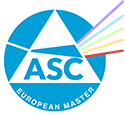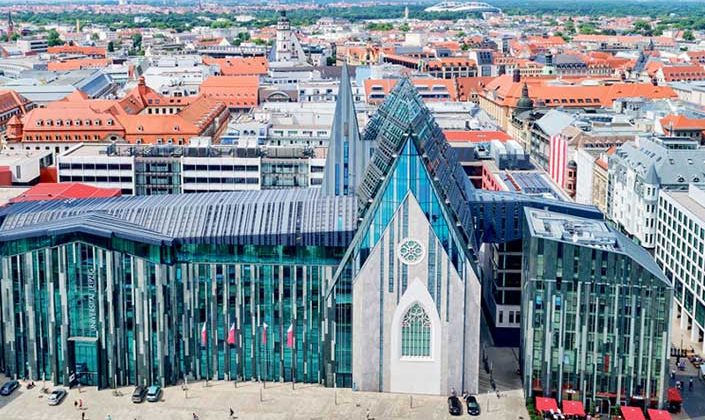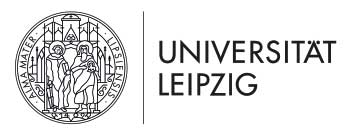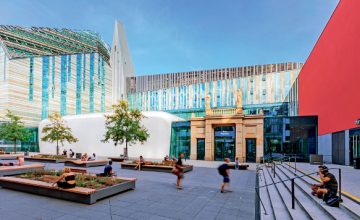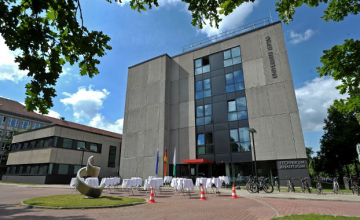Leipzig, Germany
Leipzig university
A FEW FIGURES
- 612 years old
- 30,000 students
- 10% international students
- 14 faculties
- 130 institutes
- 155 degree programmes
- 460 professorships
- 24 English study programmes
Founded in 1409, Leipzig University is among the oldest in Europe. Many world-renowned figures have taught or studied here, and major developments in the sciences have repeatedly originated in Leipzig. With its wide range of subjects and particular emphasis on the humanities, natural and life sciences, Leipzig has gained a reputation as an outward-looking institution at home and abroad. A modern comprehensive university, today it is striving for a leading position in German higher education. Its 14 faculties, with over 130 institutes and centres, are committed to interdisciplinary and cross-faculty research and teaching, cooperation with other research institutions and businesses, and international alliances. This international orientation is reflected in long-established courses of study such as Advanced Spectroscopy in Chemistry. With Central Institutions such as the Centre for Biotechnology and Biomedicine (BBZ), the German Centre for Integrative Biodiversity Research (iDiv) and the Saxon Incubator for Clinical Translation (SIKT), the University is setting new standards in the life sciences.
With the centuries-old University Library, the university archives, the art collections and the Leipzig Institute for Creative Writing, the University permanently enriches cultural life in Leipzig. Germany’s oldest botanical garden, three museums and the Teaching Collections attract many visitors. Thousands of people every year enjoy listening to the University Orchestra, the University Choir and the Unibigband
INTERNATIONAL UNIVERSITY
Leipzig University is characterised by its many international contacts, high levels of mobility and a global teaching network, which benefits in particular from joint degree programmes with foreign partner institutions. Some 38 international courses of study – including 17 integrated courses and two EU-funded Erasmus Mundus master’s programmes – reflect the internationalisation of teaching at Leipzig.
Around 3500 students from over 150 countries ensure a broad mix of cultures, enriching both academic discourse and life on campus. Leipzig University continues to preserve its centuries-old tradition as an outward-looking institution, consolidating its role as an international centre of teaching and research. The Welcome Centre supports the integration of international visiting scholars.
Leipzig University cooperates with more than 420 Erasmus+ partner universities within and outside Europe and has over 50 partnerships with other international institutions.
RESEARCH
Leipzig University has a broad research spectrum in the life sciences, the humanities and social sciences, and the natural sciences. Conducting interdisciplinary basic and applied research, it is an important partner for the transfer of knowledge and technology at regional, national and international level. Particular strengths lie in the areas of global interactions, (bio) medicine, intelligent materials, biotechnology, mathematical sciences and biodiversity. In the coming years, Leipzig aims to evolve into a leading European research university and an internationally recognised centre of training for junior researchers.
The University enhances its profile further by partnering with non-university research institutions in Leipzig – including three Max Planck, two Fraunhofer and four Leibniz Institutes, the Helmholtz Centre for Environmental Research, the Helmholtz Institute for Metabolic, Adiposity and Vascular Research, and BioCity Leipzig – and as a member of the Halle-Jena-Leipzig Central German University Alliance. International partnerships, for example with Vanderbilt University (US) and Stellenbosch University (South Africa), are testament to Leipzig’s global research links. At the Research Academy Leipzig, doctoral candidates can earn a joint doctorate with a foreign university. Leipzig University hosts six Collaborative Research Centres and, together with its partner universities in Jena and Halle, the German Centre for Integrative Biodiversity Research (iDiv), which is a DFG Research Centre. “Research, Teaching, Healing – a Tradition of Innovation” is the motto of the Faculty of Medicine, which was founded in 1415. It collaborates with the University Hospital, other faculties and non-university institutions to produce excellent results in research, teaching and medical care.
FACULTY OF CHEMISTRY AND MINERALOGY
The faculty looks back on more than 300 years at Leipzig university.
The first chemical laboratory was located in a shed of a pub of the old Pleissenburg (1804).
The internationally reknowned chemists Herrmann Kolbe, Johannes Wislicenius, Wilhelm Ostwald, Ernst Beckmann, Arthur Hantzsch and Burckhardt Helferich all worked at Leipzig University.
In Leipzig, the first Institute of Physical Chemistry in Germany was founded in 1897 ; it was named Wilhelm Ostwald Institute in 1998.
INSTITUTE OF CHEMICAL TECHNOLOGY
The Institute of Chemical Technology combines research and education on the fundamentals of heterogenous catalysis and materials science.
The applications at the institute of Chemical Technology are immediately derived from the current challenges of an innovation-oriented ans sustainable chemical industry. The recent research fileds include conversion and storage of renewable energy, valorization of biomass-based raw materials, emission reduction, reaction dynamics and diffusion as well as adsorptive separations.
Another focus area is the rational design of nanoporous and monolithic materials including hierarchically structured pore systems. The pore widths of these materials extend over a large range from nano- to micrometers, enabling systematic studies of phenomena on different length scales in applied materials and catalysis science. On the basis of a thorough characterization with multiple physico-chemical techniques, an understanding of the materials’ mode of operation in view of their chemical, textural, structural, and electronic properties is achieved.
The teaching at the Institute provides the students with the fundamentals of chemical technology and advanced modules on heterogeneous catalysis, reaction engineering, materials design and characterization as well as excursions to the chemical industry. From the corresponding knowledge, the context and perspectives of industrial applications and processes become apparent. Thus, the basics of the studies in natural sciences are related to the skills required for a professional practice in the chemical industry.
